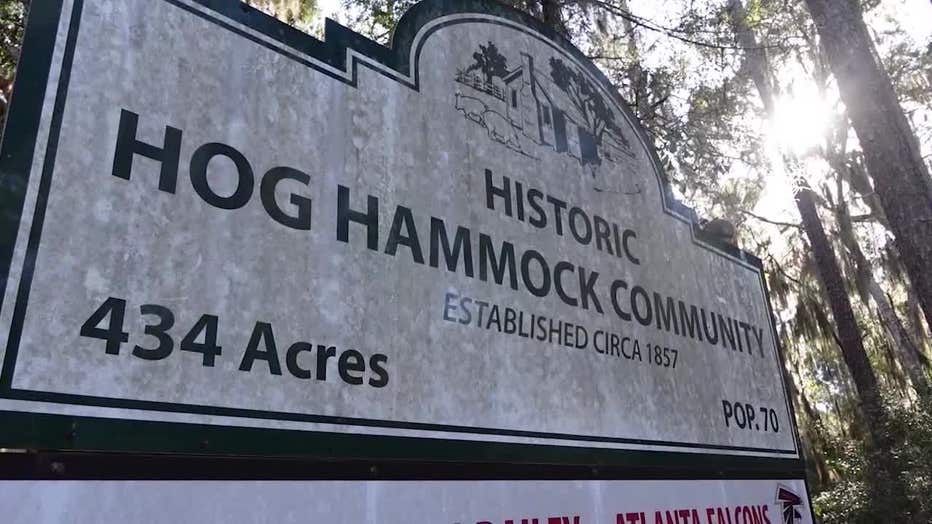Georgia Supreme Court hears Sapelo Island zoning dispute
Georgia Supreme Court hears Sapelo Island zoning
Residents of Sapelo Island, off the Georgia coast, took their county leaders to court today in Atlanta. They claim that efforts to change zoning ordinances in McIntosh County could drive them off their ancestral land.
ATLANTA - Georgia’s highest court is weighing whether residents of one of the last surviving Gullah-Geechee communities can overturn zoning changes they say threaten their way of life.
The Georgia Supreme Court heard arguments from both sides on Wednesday morning in a case that could have major implications for land rights on Sapelo Island.

Sapelo Island residents side
What they're saying:
On Wednesday, the Georgia Supreme Court heard arguments in a case involving residents of Sapelo Island’s Hogg Hummock community, a historically Black enclave settled by descendants of enslaved Africans. Residents are challenging 2023 zoning amendments passed by McIntosh County commissioners that doubled the size of homes allowed in the area.
"This petition is to protect and preserve the future of the Hog Hammock community, one of the last Gullah-Geechee communities in the United States," said Philip Thompson, an attorney representing residents.
Community members fear the zoning changes will trigger steep property tax increases and bring development that could displace longtime landowners. The residents responded by gathering more than 2,300 signatures from registered voters in an effort to force a referendum on the issue. County leaders sued to block the vote, and a judge canceled the referendum less than a week before Election Day—even after hundreds had voted early.
Thompson told the justices the community has "a constitutional right to a referendum" and argued McIntosh County had no standing to interfere. "The resolution of these issues under Georgia law is clear," he said.
Residents said they were caught off guard by the county’s 2023 decision to weaken those protections. County attorneys have downplayed the concerns, writing in one filing that allowing larger homes is so "unremarkable" that it "borders on banal."
RAW: Sapelo Island oral arguments
Raw video of Sapelo Island oral arguments in the Georgia Supreme Court on April 16, 2025.
Outside the courthouse on Wednesday, supporters rallied in favor of the referendum. Their appearance comes just months after a tragic incident on Sapelo Island. In October, seven people were killed when a ferry dock walkway collapsed during the community’s Cultural Day festival, a moment that was supposed to offer joy amid ongoing concerns about their future.
McIntosh County officials side
The other side:
McIntosh County’s attorney, Ken Jarrard, pushed back, saying zoning authority is handled differently under Georgia law and is not subject to referendum. "It’s the harm they are having to show as to why the status quo needs to be maintained, and my position is that they did not show any harm," Jarrard told the court. "Therefore, we should have that injunction overturned."
Attorneys for McIntosh County argue that unlike the Camden case, zoning is governed by a different section of the state constitution and should not be subject to a public vote. They also contend the judge overstepped by halting the zoning ordinance while the issue remains under appeal.
Gullah-Geechee community
The backstory:
The case centers not on the merits of preserving Hogg Hummock, but on legal technicalities: whether local zoning changes can be challenged by referendum and whether county leaders were legally allowed to stop the vote.
The dispute follows a 2023 Georgia Supreme Court decision that upheld a separate citizen-led referendum, which blocked Camden County’s plan to build a commercial rocket launchpad. That ruling inspired Hogg Hummock residents to pursue a similar challenge.
What is Hogg Hummock?
Dig deeper:
Hogg Hummock—also known as Hog Hammock—is home to roughly 30 to 50 Black residents. The community sits along dirt roads on Sapelo Island, about 60 miles south of Savannah. It was founded by formerly enslaved people who once worked the nearby Spalding plantation.
Isolated from the mainland, Gullah-Geechee communities like Hogg Hummock have preserved much of their African heritage, including language, crafts, and food traditions. The area was listed on the National Register of Historic Places in 1996, but it relies on local zoning ordinances for protection.
RELATED STORIES
- Judge blocks larger home permits for tiny community of slave descendants pending appeal
- Georgia slave descendants on Sapelo Island push to keep land protections
- County says Georgia slave descendants can't use referendum to challenge zoning changes
- Sapelo Island natives reach settlement in fight with county for services
- Slave descendants on Sapelo Island vow to fight on after county approves larger homes
- Celebrating Black History: The complexities of Georgia’s Sapelo Island
What's next:
The Georgia Supreme Court’s decision is expected in the coming months.

